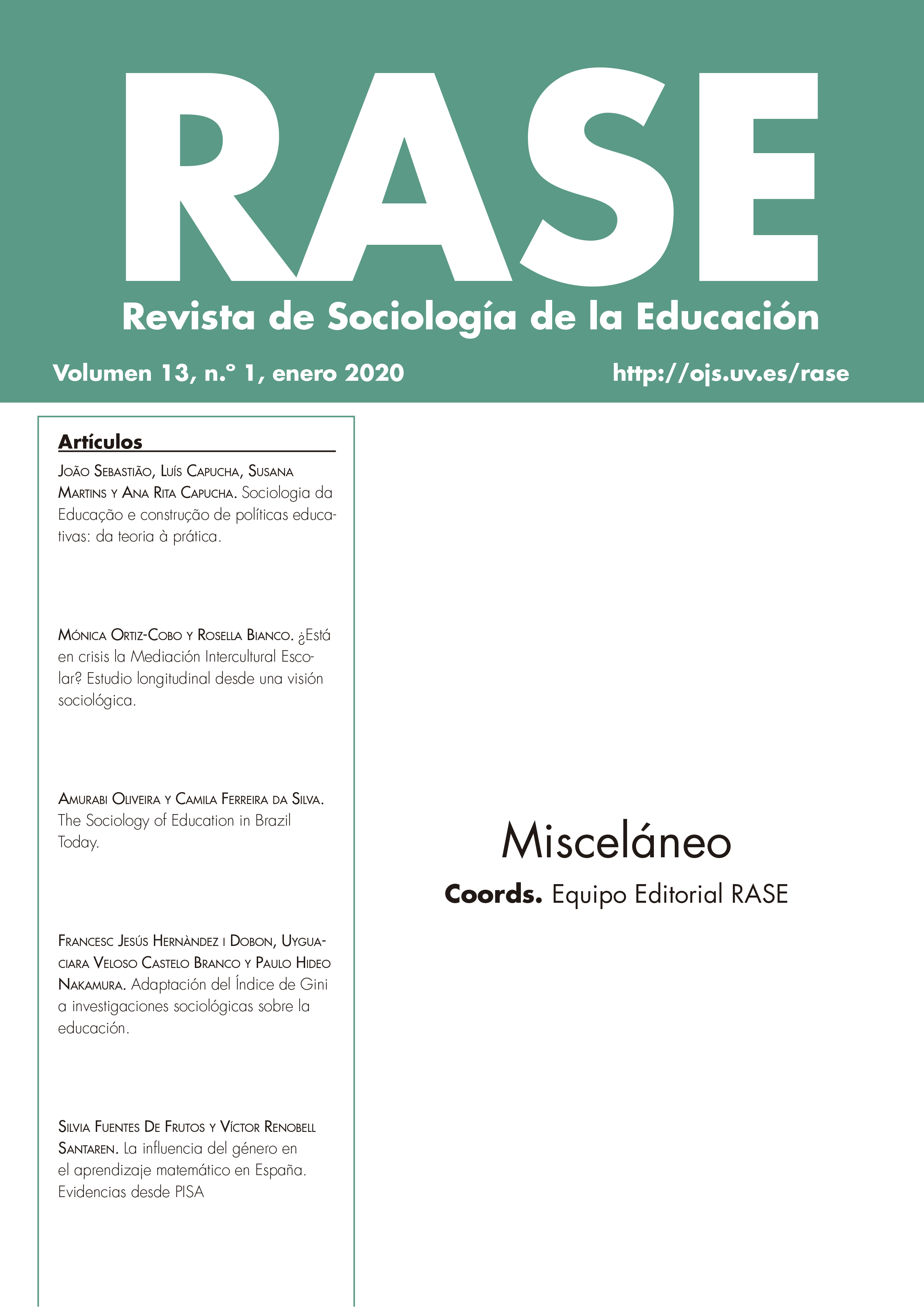Is Intercultural School Mediation in Crisis? A Longitudinal Study from a Sociological Perspective
DOI:
https://doi.org/10.7203/RASE.13.1.15765Keywords:
Immigration, mediation, conflict, identity, culture and school Abstract
Abstract
Intercultural mediation is a resource that has aimed at serving as a bridge between “cultures” in order to favour their approach and under standing. This intervention practice owns already a historical trajectory that allow us to analyse the retrospective of its practices. By this ethnographic work we aim at showing how intercultural mediation has been built in a concrete social intervention field. That is to say, the school institutions of the Granada province since its inception in 2008. The follow-up of the resource, done during the period between 2013 and 2017 in this province, has demonstrated that the fulfilment of the initial expectations has been far from being achieved. The implementation of the school intercultural mediation has lost its formal aims sight of, and has contributed to creating “differences”, ending up channelling assimilation processes, ethnification and stigmatisation of the immigrant group. Therefore, we can affirm that the school management of the intercultural mediation has wasted all of its potential, leading it both to its devaluation and a lack of institutional support. Hence, we can talk about a crisis stage of the intercultural mediation that goes beyond the decrease of active professionals due to the economic crisis that diminishes economic resources in different social areas.
 Downloads
Downloads
 References
References
Cohen-Emerique, Margalit (1997). “La negociation interculturelle, phase essentielle de l’integration des migrants”. Hommes & Migrations, nº 1208, 9-23.
Cohen-Emerique, Margalit (1999). “La negociation-mediation, phase essentialle dans l’intégration des migrants et dans la modification des attitudes des acteus sociaux chargés de leur integration”. Vie sociale. Les acteurs de l’intégration, nº 2, 139-155.
Galán, David (2008). “Los educadores sociales en los centros de educación secundaria de Extremadura”. Pedagogía Social. Revista Interuniversitaria, nº 15, 57-71.
García, Francisco Javier, Barragan, Cristina (2004). “Mediación Intercultural en la sociedad multicultural: hacia una nueva concepción”. Revista Portularia, nº4, 123-142.
Giménez, Carlos (1997). “La naturaleza de la mediación intercultural”. Revista Migraciones, nº2, 125-159.
Giménez, Carlos (2002). El corazón de Madrid. El Servicio de Mediación Social Intercultural. Madrid: Área de Servicios Sociales. Ayuntamiento de Madrid
Hennessy, María Beatriz (s.f.). El rol de la cultura en el conflicto (en línea). https://es.scribd.com/document/88529453/El-rol-de-la-Cultura-en-el-Conflicto, consultado el 7 de Diciembre de 2018.
Llevot, Nuria (2012). “La mediación intercultural en las asociaciones de inmigrantes de origen africano”. Revista Internacional de Sociología, Vol. 71, 1, 167-188.
Martínez, María Jesús y García, Rafaela (2009). Análisis y prácticas de la mediación intercultural desde criterios éticos. Valencia: Editorial Tirant lo Blanch.
Martínez, María Jesus; Sahuquillo, Piedad y García, Laura (2012). “Identidad y responsabilidad socioeducativas del mediador escolar y del mediador intercultural: hacia una clarificación de funciones”. Revista Mediaciones Sociales, nº 11, 47-71.
Otero, Milagros María (2007): “Las raíces históricas y culturales de la mediación” en Soleto, Helena y Otero, Milagros (Coords.): Mediación y solución de conflictos. Habilidades para una necesidad emergente. Madrid: Tecnos.
Pérez, Normely (2007). “Interculturalidad: ¿un ámbito de la mediación?”. Portularia, Vol. VII, nº 1-2, 107-122.
Ross, Marc Howard (1995). La cultura del conflicto. Las diferencias interculturales en la práctica de la violencia. Madrid: Paidós.
Downloads
Published
How to Cite
-
Abstract1191
-
PDF (Español)556
Issue
Section
License
![]()
This work is licensed under a Creative Commons Reconocimiento-NoComercial-CompartirIgual 4.0 Internacional.




